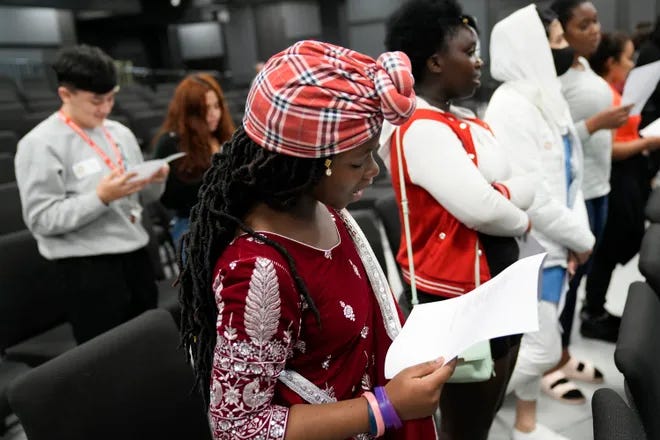The Common Thread of Music
Reconnecting with Community
The Harmony Project is an extraordinary music and art program in Columbus, Ohio that brings people together of different faiths, backgrounds, beliefs, and abilities. It was started in 2009 by David Brown to advocate for social justice and inclusion through song and service. Everyone who encounters Harmony is touched by the spirit of community. My experience of going to one of their concerts, and having conversations with community members, inspired and has stayed with me.
This summer, I presented at a conference on The Culture of Belonging in Lakeside, Ohio, a three-hour drive from Columbus. Before the conference, I looked forward to stopping in Columbus to reconnect with Harmony members. I met for lunch with David Brown, the Founder and Creative Director, and Reggie Jackson, the Artistic and Musical Director.
In the four years since I attended a Harmony concert, the organization's impact has continued to grow, despite the substantial impact of Covid-19. For example, the prison choir project grew from one in a women's correctional facility to include two men's facilities. The high school choir program has expanded to another school primarily serving immigrant and refugee children. And in 2022, Harmony received the exciting news that they were selected to become long-term tenants of a 30,000 square-foot building that had previously housed a performing arts center. Now Harmony has a permanent home for their 500 member choir to practice and some other art programs, all situated under one roof. This is its first permanent home since its founding in 2009. Last December, in partnership with ABC and John Legend, a pilot show, "Finding Harmony," documented the Harmony Project through one of its projects in Springfield, Ohio.
As impressive as these accomplishments are, what gives this community its true power are the countless opportunities for connection and learning from people who are different from each other. It is these moments that are lifting spirits and transforming lives.
I asked Reggie and David what inspires them most about Harmony these days. Both men jumped in with examples of relationship-building and unlikely connections. Reggie told me there are now choirs in two prisons for men and he loves playing music with them. David joined in, and both shared the story of the recent first-ever gathering in Ohio of women and men living in three separate correctional facilities. Three prison choirs joined in song and support of one another, something no one could have imagined.
David lit up after sharing the story of the festival within the prisons. He told me about another program he is excited about, Harmony's latest student program with Columbus Global Academy and Columbus International High School, which serves immigrant and refugee students from over 25 countries. Through learning and performing music together, these students improve their English language skills. At the same time, they learn about their communities' needs and how they can be catalysts for positive change.
A few weeks before our lunch, men and women from three correctional facilities joined to sing together. It almost didn't happen, as there were valid and predictable objections and concerns about such a gathering. That day, 54 men from Pickaway Correctional Facility and 23 men from Madison Correctional Institute were brought to the Ohio Reformatory for Women to participate in the Sunflower Arts and Music Festival.
For security reasons, the men were not told in advance that they would be going. They were woken at 3 a.m. to shower, eat, and get on the buses. One warden said the excitement was palpable when they found out where they were going.
Nearly 300 members of three prison choirs, including over 200 from the Ohio Reformatory for Women, performed for the Harmony Project volunteers and staff from all three prisons. The women wore yellow Harmony t-shirts and the men wore green. They sat separately in the gymnasium, but they clearly were able to enjoy each other's company.
In the afternoon, every woman in the prison who wasn’t in the choir came outside and sat on the grass, cheering the choir and the guest performers from the mens’ facilities.
Despite the complications of making this happen, Warden Rochelle Moore from a visiting facility said it meant everything and was more than worth it. She added that the on-site harmony choir in their facility has changed the prison culture by bringing in volunteers to sing with the men. And also, society will change by seeing that these men are not different from the rest of us.
“It was wonderful to see people call each other by their names rather than their inmate numbers,” Reggie told me. One of the inmates said that the best part about this experience was that others could see the peaceful, happy, joyous part of them.
This is just one joyous example of the truth to David Brown’s proclamation, “Community is our superpower!”





